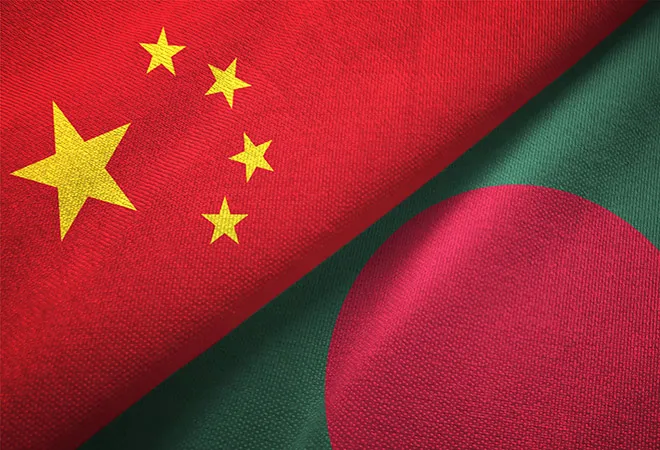
The last-minute postponement of Chinese Defence Minister Wei Fenghe’s visit to Bangladesh, after going to Nepal, in November, has raised curiosity about the state of the relations between the two countries. Since no specific reason has been cited, a host of speculations have surfaced, with no tangible conclusion.
One of the likely reasons for the visit postponement could be the state of Covid-19 pandemic in the country, with the Foreign Minister and the Foreign Secretary also being infected with the virus. Another important reason thought to be behind the visit change is Bangladesh’s effort in balancing its relationship with China and India, the two Asian powers – with both, Bangladesh enjoys a warm and friendly relationship.
The reason behind such presumption is because the defence minister’s visit was scheduled at a time when the rivalry between China and India is at its peak, and the visit is largely viewed as China’s effort to gravitate India’s neighbours towards it. Amidst a plethora of assumptions, the trend showcases Bangladesh’s discreet assertion of its reluctance to be part of any axis, whether it is a competition between two Asian giants or global powers.
All-weather friends
China and Bangladesh are considered to be all-weather friends and cooperation in the areas of defence and economy are core to the bilateral relationship. Notably, China is the only country with which Bangladesh has a defence cooperation agreement. And China is the largest supplier of arms to the Bangladesh army. The Bangladesh Navy purchased its first submarine from China.
China is Bangladesh’s biggest trading partner. Additionally, it is a development partner and is investing heavily in various infrastructure projects. During Chinese President Xi Jinping‘s visit in 2016, Beijing promised to invest $24 billion in various infrastructure projects.
So, given the bonhomie between the two countries, the postponement of the visit came as a major surprise to all.
Bangladesh has been mindful of its interests and has unreservedly expressed its dissention to any proposal or activities that would disturb the country’s goal. The stalling of the Sonadia deep seaport project is an example. The Sonadia port project was proposed to be constructed with Chinese funding. However, the project was withheld because of the conditions laid down by China. Bangladesh felt the terms and conditions were not favourable to the nation’s interests.
Bangladesh, once considered a basket case, is one of the fastest-growing economies in the world. Soon, it will be a middle-income country and aspires to elevate itself into being a developed one by 2040. Thus, enhancing economic growth is necessary to attain this goal, and it is seeking the cooperation of all towards this end.
Silent on Galwan skirmish
Bangladesh feels the necessity of maintaining a peaceful and friendly relationship with all, that would help to catapult the country to the next level of prosperity. In tune with this goal, the nation anchored its foreign policy on the principle of ‘friendship with all and malice towards none’. The country wants to avoid any situation that would disrupt its desired goal.
Dhaka’s reluctance to comment on the recent standoff between China and India at the Galwan Valley in Ladakh is reflective of this mindset. The country feels it would benefit from maintaining good relationship with both China and India. Bangladesh has a strong economic relationship with India. New Delhi has promised to provide around $10 billion of economic assistance. Also, Indian companies are investing in Bangladesh. To date, Indian companies have invested around $3 billion, which is likely to grow in the future.
Again, Bangladesh’s hesitation to join the US’ Indo-Pacific Strategy (IPS) arises out of a similar consideration. The country perceives the IPS to be having a military component to it. The country prefers to be away from any situation that might push it into into unnecessary contestation with any other power.
The recent trend adds a new dimension to the geo-politics in South Asia. Largely, the South Asian geo-politics used to be dominated by the run for supremacy between China and India, and the perspective of the other countries in the region had limited space. Now, nations like Bangladesh seem to chart their pathways on the path where primacy is given to economics than strategic alliances.
However, as the global order tends to shift with the Covid-19 pandemic, where competition between great powers is likely to be harsher, it will be worthy to watch the reaction of the countries like Bangladesh. Will they be able to pursue their ingenuity or succumb to the great power game?
This essay originally appeared in South Asia Weekly
The views expressed above belong to the author(s). ORF research and analyses now available on Telegram! Click here to access our curated content — blogs, longforms and interviews.




 PREV
PREV


